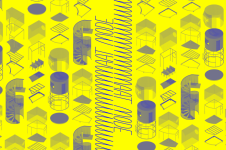“and I am sparse in dense fluidity” – Gestures of Freedom
The BUALA cycle at maat
Day 1 with Marta Lança, Catarina Barata, Inês Brasão, and Maria Mire
"The democratic maturity of a country is not unshakeable, the same for its freedoms that so many times are put under threat. From the meanings and practices of those freedoms in our daily life, artistic and social (irradiating to other contexts), the purpose of this cycle is to rethink freedom and try it once again. We are facing a sanitary and social crisis, which has accentuated the precariousness and discriminatory action towards certain groups. The environmental crisis is looming and the hierarchisation of humanity increases. Aware that social well-being is far from happening, freedom is under our tongue. However, freedom can be something very different depending on the space, environment, and moment, which we are referring to.
In a society still marked by profound gender inequality, and understanding emancipation and freedom as processes that are daily struggles, we debate achievements and rights, and expectations when it comes to the body, career, maternity, representation, circulation, and artistic proposals. Part of it are also sickness, violence, sexual freedom, the domestic universe, the world of labour (and invisible labour), the internalisation of deprivations and our current forceful will to break with the status quo. We think of freedom in the time we are living, as contributing for a portrait of the country in its structures and inequalities, with the help of paths of intelligence, courage, emancipation, and the fight for happiness."
— Marta Lança
Introduction to the cycle by Marta Lança
What do women's experiences of childbirth reveal?
Talk by Catarina Barata
The way people give birth and are born depends on social, cultural, economic, historical, and political factors. In Portugal, as in other countries, a growing number of women are questioning whether it’s inevitable to suffer abuse during childbirth. This presentation is based on an ongoing research on perceptions, discourses, and representations about experiences of obstetric violence.
The body and the work of women: a plural condition
Talk by Inês Brasão
The first time March 8 was celebrated in Portugal, the year was 1975, Jornal de Notícias wrote as a headline: “International Women’s Day: It is urgent to release the subproletariat”. Having this as a starting point, we question the body and the work in the plural feminine condition.
Painless Labour
Talk by Maria Mire and screening of her documentary film Painless Labour, 2020
In an act of sincere generosity, an 80 year old woman offers furniture to a young neighbour who lived on Santos Dumont Avenue. One morning, possibly spring, while reading a newspaper clipping about a woman doctor who lived on the same avenue, that generous woman finally got a name: Cesina Bermudes. Doctor, obstetrician, researcher, and feminist, Painless Labour is a portrait of someone that so surreptitiously passed through our lives but left a legacy that we try to unwrap.
|
Catarina Barata is an anthropologist and video artist. PhD candidate in Anthropology at the Institute of Social Sciences of the University of Lisbon (ICS-ULisboa) researching about experiences of obstetric violence.
Inês Brasão is a sociologist, teacher, author of O Tempo das Criadas (2012) and coauthor of "Fêmea, Uma História Ilustrada das Mulheres" (2019).
Maria Mire (Maputo, 1979) has a PhD in Art and Design by the Faculty of Fine Art of Porto (2016), with the thesis "Fantasmagorias: A Imagem em Movimento no Campo das Artes Plásticas" [Phantasmagoria: The Moving Image in the Field of the Visual Arts]. Currently, she is a teacher co-responsible for the Department of Cinema/Moving Image at Ar.Co, in Lisbon, and a visual artist.
|
As part of the celebrations of the 10 years of the BUALA platform and having freedom as an eternal ambition and activation, “and I am sparse in dense fluidity” – Gestures of Freedom, the BUALA cycle at maat proposes to think of freedom in the actual times, contributing for a portrait of Portugal in its structures and inequalities, with the help of paths of intelligence, courage, emancipation, and the fight for happiness. |






